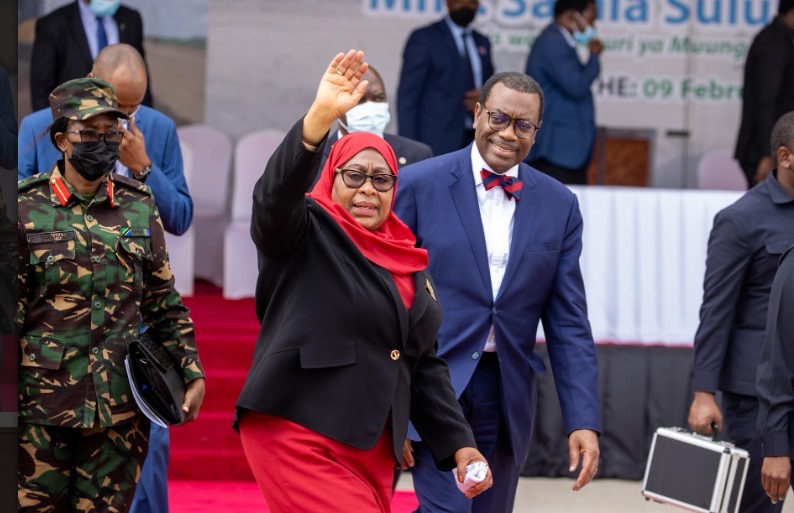Edited by : ZAINAB ALIYU O.
Tanzania is setting new benchmarks in food self-sufficiency across Africa, raising hope that the fight against hunger and malnutrition on the continent is achievable.
President Samia Suluhu Hassan of Tanzania said her country had reached 128 percent food security and is now exporting surplus to neighbouring countries.
She was speaking on Thursday 31 October during a high-level session at the World Food Prize Norman E. Borlaug International Dialogue in Iowa, moderated by the president of the African Development Bank Group, Dr Akinwumi Adesina. The session, entitled “Bold Measures to Feed Africa,” also featured the President of Sierra Leone, Julius Maada Bio.
President Suluhu Hassan told a packed auditorium, that after achieving food sufficiency, “we are now working on quality, accessibility and affordability, and how to minimize post-harvest loses.”
Adesina praised President Suluhu Hassan’s leadership and strong political will for Tanzania’s success. He said the growing commitment of other African nations, underscores the continent’s readiness for large-scale investment in agriculture and food production.
He recalled how the African Development Bank’s 2023 Dakar 2 Food Summit ignited commitment across Africa for country-specific food and agriculture compacts. The summit, co-hosted by the government of Senegal and the African Union, was attended by 34 African Heads of State and Government. It has mobilized more than $72 billion to date.
President Suluhu Hassan said Tanzania left Dakar 2 summit with a signed compact and determination to implement increasing productivity as well as the political will to create institutions and support structures for its farmers.
“We realized that not investing in agriculture is much more costly than investing in the sector,” she said.
Tanzania has broken another record by becoming a processor and net exporter of cashew nuts, which for nearly all African countries, are processed in Asia. The country has also succeeded in rural electrification with nearly 100 percent of its 12,300 villages with electricity, President Suluhu Hassan said.
Backed by investment from the African Development Bank, Tanzania’s Creating jobs for Youth and Women programme is targeting the country’s 65% youth population with training in farming, agriculture, livestock and crop farming.
The Tanzanian leader said each youth is given 10 acres of land and is supported by training, already 11,000 have benefitted and this year’s harvest has begun. “We thank the African Development Bank for supporting that program,” she said.
Joining Adesina on stage, President Bio of Sierra Leone shared his country’s success with the Feed Salone program, which has cut rice imports by 20 million tons and spurred agricultural productivity.
Until then the nation had not paid enough attention to food security and Bio said he had focused on education during his first term. “Agriculture is the basis of development,” President Bio stated.
The Feed Salone programme has helped boost agricultural productivity to feed the nation and to enable them export. “Already we have reduced rice imports by 20 million tons,” he said.
“We are here to share the Sierra Leone story and invite investors. We are an ambitious nation and want to succeed to attract investors,” President Bio said.
Adesina highlighted the African Development Bank’s efforts to reshape global perceptions of Africa and drive investment in critical sectors like agriculture.
He said the event and the Africa Dialogue, also hosted by the African Development Bank in Iowa, was intended to break stereotypes and showcase Africa’s potential, a continent that is home to 65% of the world’s remaining arable land and has the technology to turn Africa into a global food basket.
“This is why we bring African leaders here so you can hear from them directly,” Adesina said.

